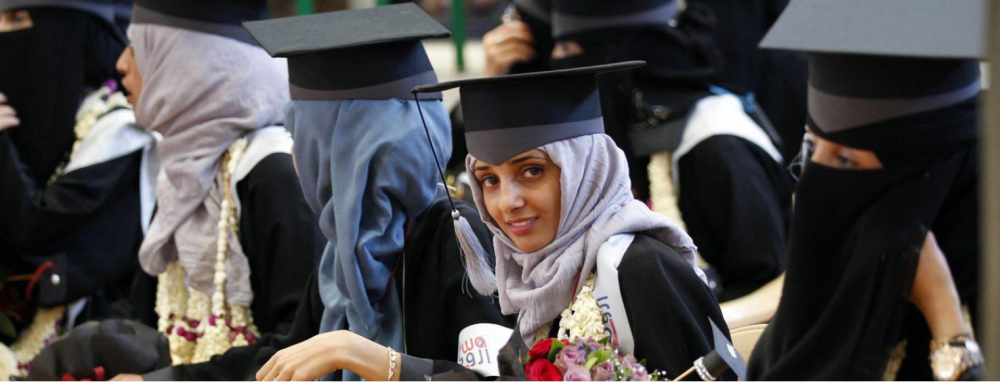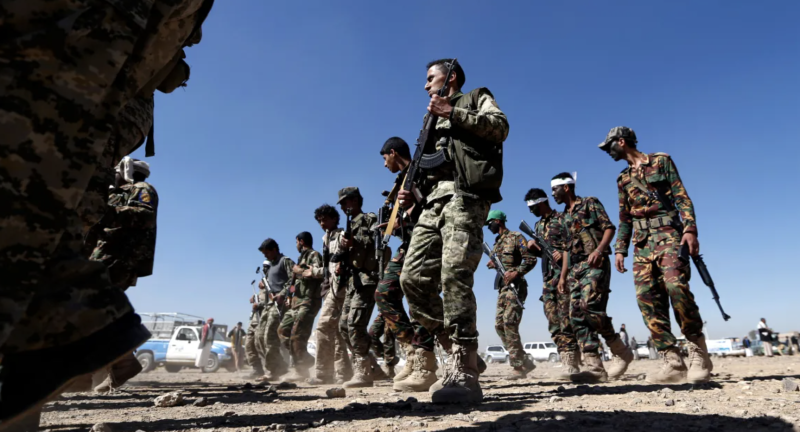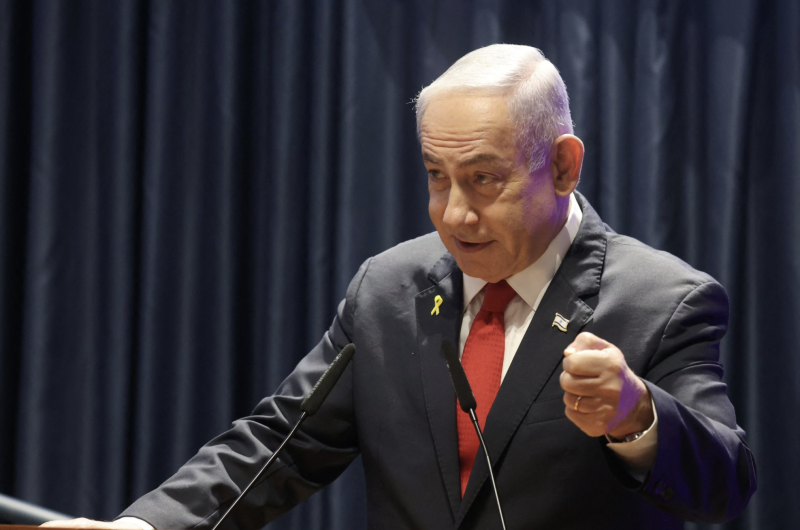Gender Segregation at Sanaa University: A Worrying Trend for Yemen


In August, a student was irrevocably expelled from the Faculty of Sharia and Law at Sanaa University for greeting her female friend in the university’s all-women cafeteria with a kiss on the cheek. According to local sources, the university suspected that the student’s behavior was suggestive of homosexual tendencies.
This comes after the Faculty of Mass Communication at Sanaa University—the largest educational institution in the country—decided to implement a new policy of gender segregation at the beginning of this academic year. For the first time in the university’s history, students of each gender would study separately for three days every week. This policy was later adopted by other university departments, including the faculties of commerce, Sharia, and medicine.
Women in Sanaa have faced these kinds of punitive measures on a daily basis under the rule of Houthi militias. The student expulsion and gender segregation policy are just two examples of a broad array of policies that Yemenis describe as regressive and extremist.
In August, a student was irrevocably expelled from the Faculty of Sharia and Law at Sanaa University for greeting her female friend in the university’s all-women cafeteria with a kiss on the cheek. According to local sources, the university suspected that the student’s behavior was suggestive of homosexual tendencies.
This comes after the Faculty of Mass Communication at Sanaa University—the largest educational institution in the country—decided to implement a new policy of gender segregation at the beginning of this academic year. For the first time in the university’s history, students of each gender would study separately for three days every week. This policy was later adopted by other university departments, including the faculties of commerce, Sharia, and medicine.
Women in Sanaa have faced these kinds of punitive measures on a daily basis under the rule of Houthi militias. The student expulsion and gender segregation policy are just two examples of a broad array of policies that Yemenis describe as regressive and extremist.
A MISOGYNISTIC DECISION
At the end of July, the University Student Forum, a body the Houthis created to replace the Yemeni Student Union that controls all academic decisions, announced the gender segregation policy for the start of the new academic year.
Many Yemeni academics immediately criticized the move, including Dr. Samia Al-Aghbari, head of the Department of Journalism and Publishing in the Faculty of Mass Communication. As a result, she was dismissed from her from her position, and the faculty’s council was left with no remaining female members—in line with the Houthi authority’s systematic gender-based discrimination in Sanaa and other areas under their control. In an interview for Sada, Al-Aghbari said that she was surprised by this arbitrary decision, but affirmed that it would not dissuade her from opposition to gender segregation, which she described as disastrous not only for university education but also for the future of the country’s youth.
REACTIONS FROM SUPPORTERS AND OPPONENTS
Although the Houthi authorities have been able to impose gender segregation, university students protested the policy, even announcing a strike. As they argued in a published statement, segregation reflects a demeaning view of women, subjects female students to the stigma of conservative Yemeni society, which is quick to slander women based on suspicion alone, and could deprive female students of educational opportunities.
Yemeni lawyers and human rights activists also denounced the decision, which they felt threatened Yemeni society as a whole. In an interview for Sada, Arwa al-Shamiri, an activist and a lawyer at the Yemeni Women's Union, said that segregation in educational institutions only serves the goals of religious extremism, and creates an environment where the most violent and reactionary social behaviors flourish. She added that such regressive policies may also promote a culture of harassment and rape against women. Rather than separating men and women, Al-Shamiri argues that Yemeni society rather needs to promote coexistence between the sexes within a legal and social framework that respects the obligations and duties of both.
As for the Houthis and their supporters, the reaction to the policy was entirely different. Following the decision, the Minister of Higher Education Hussain Hazeb claimed that he had not been informed of the Faculty of Mass Communication's intention to implement gender segregation. However, in a tweet that sparked much controversy and enraged Yemeni human rights activists, he praised the policy’s underlying principles, arguing that “there is no problem with the idea of gender segregation as a collective measure to mitigate or prevent the repercussions of the soft war1, and to strengthen the [Islamic] faith identity that some have abandoned."
Mohammed Ali al-Houthi, the de facto leader of the Sanaa-based Supreme Political Council, suggested in a tweet that the fathers of female students who agree to co-education should sign a consent form specifying who their daughters are allowed to talk to and where on campus. The tweet, which implicitly questions the morality of Yemeni women, was also met with widespread criticism on social media.
SHRINKING EDUCATIONAL OPPORTUNITIES
Since coming to power in Yemen, the Houthi movement has adopted an wave of reactionary policies, mirroring developments in Afghanistan. These have had deleterious effects on both the quantity and quality of education, and has pushed academics to leave Yemeni universities entirely. But female students, who are pushed to drop out of school, have paid the highest price—a worrying sign for the future of Yemeni women as a whole.
A series of similar Houthi decisions against female students in Yemen will only entrench patriarchal social norms and further fragment Yemeni society. If Houthi leaders face no repercussions, Yemeni women will be further marginalized, facing higher rates of domestic violence and divorce, and lack any female leaders to advocate on their behalf.

Aden – The Combined Maritime Forces (CMF) have announced the launch of a new multinational operation aimed at countering piracy and enhancing…

Sana'a – The United Nations has disclosed new intelligence indicating increased cooperation between the Houthi armed group in Yemen and Somal…

Sana'a – Israeli Prime Minister Benjamin Netanyahu has issued a sharp warning to Hezbollah and Yemen’s Houthi rebels, declaring that Is…